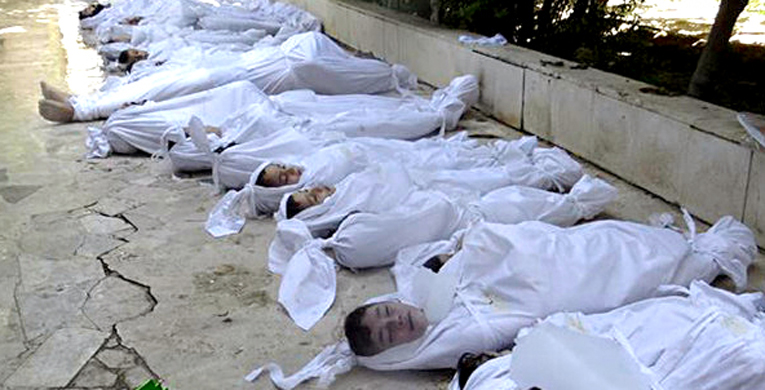
Photo from Local Committee of Arbeen
I remember sitting in class as a child and watching breaking news interruptions portraying a terrifying image of two planes crashing into the Twin Towers, fueling anger and sadness in my mind. Twelve years later, I see my niece and nephew watching innocent citizens in Syria, many of them children, dying from exposure to chemical weapons. The same emotions are visible in their eyes.
Like George W. Bush in 2003, President Barack Obama stands behind a podium addressing the world about an act of terror. Our Commander in Chief, after saying the use of chemical weapons would result in the crossing of a “red line,” attempts to sell the idea of military intervention on Syrian President Bashar al-Assad after connecting his regime with the speculated chemical weapons attack on Aug. 21 that killed 1,429 people.
Syria continues to engage in a civil war between the Assad regime and a coalition of anti-government rebels that started in March 2011 and has claimed more than 100,000 lives. Over two million Syrians have fled and even more are displaced within the country.
Nine years after Operation Iraqi Freedom, the new antagonist Assad replaces Saddam Hussein. Once again, the United States finds itself on the brink of military conflict with of a Middle Eastern government in possession of weapons of mass destruction.
However, there are a few differences in this generation’s conflict.
The U.S. is not directly under attack from the chemical weapons thus making it difficult for the president to win popular support for a similar war that he campaigned against in 2008. Instead of having the world’s support like the post-9/11 Iraq invasion, the Obama administration’s main source of assistance would come from the United Kingdom and France.
Britain is not likely to intervene after Prime Minister David Cameron lost a crucial vote to support the U.S.’s potential military strike. The endorsement failed after British Parliament shot down the idea Aug. 29.
France’s involvement is questionable at best. The country continues to feel the effects of the European austerity crisis while dealing with an unemployment rate of 10.9 percent — a 15-year high.
The country of Syria has a strong alliance with Iran and Russia. Both countries continue to threaten the U.S. following the Obama administration’s desire to attack the Assad regime.
Russia makes money supplying arms to the Syrian civil war and uses a warm-water port in Syria. Russian President Vladimir Putin continues to express anger with the U.S. for a lack of evidence against Assad and has deployed multiple warships into the Mediterranean Sea.
Iran backs Syria with oil trade and religious agreements. Iran, being the world’s most populous Shiite nation, shares a mutual contempt with the Sunni-filled rebels that continue to fight Assad. Iran even threatens to attack its longtime regional rival Israel if the U.S. were to intervene in Syria.
China sits in a difficult position. The country uses a lot of oil from Syria’s ally Iran, but would rather not engage in a conflict with its biggest trading partner: the U.S. Although China admits it does not approve of chemical weapons, the government continues to use its veto power with Russia in United Nations Security Councils.
President Obama left the decision to use military force up to a vote in Congress, which will take place as early as Sept. 9 when Congress returns from recess. The vote appears to be an even split with big names from both parties being vocal on each side of the issue.
If the Obama administration receives support for the attack, it could use the five destroyers already deployed in the Mediterranean Sea, aircraft carrier USS Nimitz and its strike group in the Red Sea. Each destroyer carries up to 90 Tomahawk missiles that are capable of long-range assaults on important Syrian structures.
The threat of escalation into a global conflict has left many pondering the idea why the U.S. would want to intervene. After all, a military campaign is expensive, and the $16.4 trillion national debt has left many people wondering how the U.S. could afford this mission.
“Look at our economy after 2008,” said Ricky Chambliss, an economics major at The University of Southern Mississippi. “There’s only so much we can do when our debt is climbing at such a fast rate.
“We’re not in a position to repeat the previous administration’s mistake,” he added.
An even more disturbing thought would be evidence that someone other than the Assad regime used the chemical weapons. Although the Obama administration claims assurance that Assad is responsible, no evidence surfaced in the media, and the Russian and Chinese governments aren’t buying.
Various online news platforms promote the idea of the rebels using the chemical weapons as a way of gaining U.S. and U.K. assistance against the enemy. The weapons are said to have been provided by Saudi Arabia, a staunch rival of Iran in the Middle East’s oil market.
To further support this claim, a CBS News report stated that the rebels’ victories became “increasingly rare” after interviewing Syrians. Why would Assad want to focus the world’s eyes on his regime if the war was in his favor?
Who exactly are these anti-government rebels? Some are former soldiers that joined the Free Syrian Army and want to end Assad’s relentless dictatorship. Others are jihadists that have been linked to al-Qeada. The U.S. supports the rebels in the form of arms and supplies, but video evidence claims these militants eat the organs of their slain enemies and even behead civilians.
However, supporters of military intervention want the U.S. to aid the Syrian refugees that can’t defend themselves. These supporters even argue that letting Assad slide after using chemical weapons would send a message of weakness to other governments like North Korea and Iran that continue to pursue nuclear weapons.
With scores of innocent people dying thousands of miles away, why should students at Southern Miss care? There are many consequences to attacking Syria or simply remaining idle on the world stage.
By even mentioning war, the price of crude oil per barrel continues to rise and will guarantee higher gas prices as the Middle East’s oil transportation would be disrupted.
Our brothers and sisters in the U.S. Armed Forces may likely be deployed into a battlefield with the possibility of chemical weapons used.
“I don’t want to do it, but it’s my duty, and I’m proud to do it,” said Spc. Tyler Strong, a three-year soldier of the Army National Guard said when asked if he would deploy to Syria like he did in Afghanistan.
“Nobody wants to fight. God forbid, if we have to we will. Nobody wants peace as bad as soldiers,” he said.
Our generation has the potential to use public discussion in a way we couldn’t in 2003. With hashtags and Facebook statuses becoming more powerful than ever, our voices become louder and information is readily available.
“I think it’s something that needs to be watched closely,” Chambliss added. “I think we shouldn’t act with as much haste as George W. Bush did in Iraq. We should wait on U.N. compliance. If Obama goes through with it, it’s going against everything he preached for in 2008.”
The images of smoke coming from the World Trade Center is substituted with images of children foaming at the mouth from the use of chemical weapons. Whether you make a decision based on humanitarian values or one that America should not be the “World Police,” you should make your voice heard in the debate over this generation’s 9/11.
Information for this article was provided by CNN.com and NBCNews.com.
































